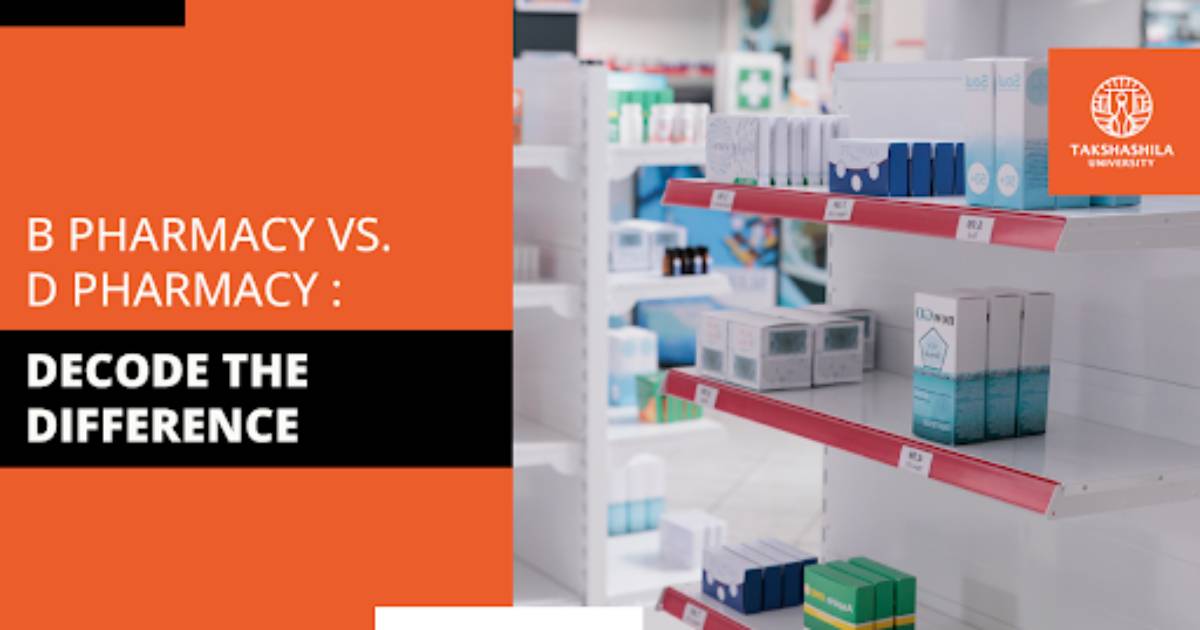Pharmacy, a pivotal field in healthcare, is the art and science of preparing and dispensing medications, ensuring their safe and effective use.
Pharmacists are crucial in patient care, offering drug therapy management and counselling expertise. As the healthcare sector evolves, the demand for skilled pharmacy professionals has surged, highlighting the importance of pharmacy education.
This blog aims to decode the differences between two primary pathways in pharmacy education, Bachelor of Pharmacy (B Pharmacy) and Diploma in Pharmacy (D Pharmacy), guiding aspiring pharmacists in making informed career decisions.
Overview of B Pharmacy Vs D Pharmacy
The choice between B Pharmacy and D Pharmacy hinges on understanding their core differences, which can significantly impact career trajectories.
B Pharmacy is a four-year undergraduate degree focusing on the in-depth study of drugs, their mechanism of action, drug development, pharmacokinetics, and pharmacodynamics.
In contrast, D Pharmacy is a two-year diploma course that provides foundational knowledge on pharmaceutical sciences, focusing primarily on the basics of dispensing and preparing medications.
| Aspect | B Pharmacy | D Pharmacy |
| Duration | 4 years | 2 years |
| Level | Undergraduate degree | Diploma course |
| Focus | Comprehensive understanding of pharmaceutical sciences | Basic principles and practices of pharmacy |
| Scope | Research, formulation, therapy management | Dispensing, community pharmacy |
Course Structure- Differences You Must Know!
The curriculum of both programs lays the groundwork for a career in pharmacy, but they differ significantly in depth and breadth.
- B Pharmacy courses cover advanced topics such as drug interaction, medicinal chemistry, drug formulation and development, patient care, and ethics. The program also includes practical lab work, research projects, and internships, offering students a comprehensive understanding of the pharmaceutical field.
- D Pharmacy curriculum is designed to prepare students for roles in dispensing pharmacy, including basic pharmacology, pharmaceutics, pharmacy law, and ethics. The course focuses more on practical aspects of pharmacy operations, such as accurately preparing and dispensing medication.
| B Pharmacy | D Pharmacy |
| Human Anatomy and PhysiologyPharmaceutical ChemistryPharmacognosyPharmacologyPharmaceutical AnalysisBiopharmaceutics and PharmacokineticsPharmaceutical Biotechnology Quality Assurance Clinical Pharmacy and TherapeuticsPharmacovigilance | Pharmaceutics I & IIPharmaceutical Chemistry I & IIPharmacognosyBiochemistry and Clinical PathologyHuman Anatomy and PhysiologyHealth Education & Community PharmacyDrug store managementPharmaceutical jurisprudence |
Know The Eligibility Criteria
Eligibility for both courses typically requires completion of higher secondary education (10+2) with science subjects. However, institutions might have additional criteria, such as entrance exams or interviews.
Detailing these criteria involves discussing common entrance tests like the Pharmacy Entrance Test (PET) and the nuances of the selection process, including how to prepare and what to expect.
| Criterion | B Pharmacy | D Pharmacy |
| Educational Qualification | 10+2 with Physics, Chemistry, and Biology/Mathematics | 10+2 with Physics, Chemistry, and Biology/Mathematics |
| Minimum Marks | 50% in 10+2 | 45% in 10+2 |
| Age Limit | No specific limit (varies by institute) | No specific limit (varies by institute) |
Get To Know The Fee structure
The fee structure varies significantly across institutions and may be influenced by factors such as location, institution type (government or private), and facilities provided.
| B Pharmacy | D Pharmacy |
| INR 35,000 – 1,50,000 per annum | INR 10,000 – 50,000 per annum |
Additionally, it’s beneficial to consider scholarship opportunities, financial aid, and the return on investment for each degree, considering the career earnings potential.
In terms of program costs, D Pharm is comparatively cheaper than B Pharm.
Career Opportunities After B Pharm Vs. D Pharm
There is good demand for both B Pharm and D Pharm professionals in India. However, B Pharm degree holders have access to more job roles, higher salaries, and better career growth prospects.
Job Roles
| B Pharmacy | D Pharmacy |
| PharmacistClinical Research AssociateDrug Safety AssociateRegulatory Affairs OfficerMedical WriterPharmaceutical Sales RepresentativeQuality Control/Quality Assurance OfficerProduction Manager in Pharmaceutical IndustryCommunity PharmacistHospital PharmacistResearch ScientistPharmacovigilance SpecialistDrug InspectorFormulation Development ScientistAnalytical Chemist in Pharmaceutical IndustryMedical Affairs AssociatePharmacoeconomics AnalystPharmaceutical Marketing ManagerDrug Information SpecialistAcademic Researcher/Professor in Pharmacy | Pharmacy TechnicianAssistant PharmacistSales Representative in Pharmaceutical IndustryMedical RepresentativeDrug Dispensing TechnicianPharmaceutical Production AssistantPharmacy Store ManagerPharmaceutical Quality Control AssistantPharmaceutical Regulatory Affairs AssistantClinical Research CoordinatorDrug Safety AssistantPharmacy Data Entry OperatorPharmacy Benefit ManagerPharmacy Inventory ManagerPharmacy Assistant in HospitalPharmaceutical Packaging AssistantPharmacy Sales AssistantPharmacy Billing SpecialistPharmacy Customer Service RepresentativePharmacy Compliance Officer |
Top Recruiters
Leading
- Pharmaceutical companies,
- Research organisations,
- Hospitals,
- Healthcare centres and
- Retail pharmacies
actively seek both B Pharmacy and D Pharmacy graduates.
Salary Insights
- B Pharmacy: Starting salaries range from INR 2,50,000 to 4,00,000 per annum. With experience, professionals can earn upwards of INR 6,00,000 annually.
- D Pharmacy: Initial salaries range from INR 1,20,000 to 2,00,000 per annum. Experienced diploma holders can expect salaries above INR 3,00,000.
Scope Of B Pharmacy And D Pharmacy
Scope Of Higher Studies
- B Pharm graduates can pursue an MPharm (Master of Pharmacy) in various specialisations like Pharmaceutics, Pharmacology, Pharmacognosy, Clinical Research, etc. This opens doors to research and clinical roles.
- They can also opt for a PhD in pharmacy, which will allow them to teach and conduct research in academic institutes and pharmaceutical companies.
- D Pharm holders are eligible for MPharm but have to clear B Pharm ((lateral entry-second year) or entrance exams.
Future Scope
- B Pharm graduates can become licensed pharmacists, clinical research associates, drug inspectors, regulatory affairs managers, and more.
- With MPharm/Ph.D., roles like Associate Professor, Professor, Principal Scientist, Head- Clinical Research, etc, are possible.
- Some can even start their own ventures like pharmacies, drug stores, diagnostic centres, etc.
- D Pharm holders can work as licensed pharmacists, pharmacy supervisors, and medical representatives or opt for pharmaceutical sales and marketing.
- With experience, they can head hospital drug departments or establish their own pharmacy chain.
- MPharm opens up opportunities in specialised domains like clinical trials, pharmacovigilance, etc.
- Both degrees allow for pursuing careers abroad after qualifying exams like NAPLEX, FPGEE, PLAB, etc. Countries like the US, Canada, the UK, Australia, and Germany are popular choices.
B Pharmacy Vs D Pharmacy : Which Is Better?
Deciding between B Pharmacy and D Pharmacy involves considering your career goals, study duration, financial investment, and personal interests. Here are some pointers and questions to help you decide.
Career Goals
Do you aspire to engage in research, drug development, or higher academic pursuits? B Pharmacy may be the ideal choice. D Pharmacy could be the way forward if you’re inclined towards a quick entry into the workforce, especially in retail or community pharmacy.
Duration and Investment
Are you prepared for a 4-year academic commitment and associated costs, or do you prefer a shorter, less financially demanding route?
Scope of Practice
Consider whether you aim to work in a more clinical, research-oriented setting or dispensing and community pharmacy.
| Questions to ponder include: What are your long-term career aspirations?How much time and financial resources will you invest in your education?Do you prefer a more patient-oriented role, or are you inclined towards the research and development side of pharmaceuticals? |
Conclusion
In the battle, B Pharm Vs. D Pharm, both fields offer unique and rewarding career paths in the pharmaceutical sector. While B Pharmacy provides a deeper dive into the world of pharmaceutical sciences, preparing students for a broad range of opportunities, D Pharmacy offers a practical, shorter route to entering the pharmacy profession.
Frequently Asked Questions (FAQs) – B Pharmacy Vs. D Pharmacy: Decode the Difference
1) Which is better, B Pharm or D Pharm?
B Pharm is generally considered better than D Pharm as it provides more career options, growth prospects, and higher salaries in the long run due to its in-depth curriculum.
2) Who earns more, B Pharm or D Pharm?
On average, B Pharm graduates tend to earn more than D Pharm graduates in India, with salaries for B Pharm being in the range of Rs.300,000-500,000 per annum compared to Rs.150,000-250,000 per annum for D Pharm.
3) Is B Pharma equal to doctor?
No, B Pharma is not equal to being a doctor. A B Pharma degree qualifies one to work as a licensed pharmacist but does not allow independent medical practice like a doctor with an MBBS degree.
4) Which Pharmacy degree is the best?
Overall, a B Pharmacy degree is considered the best pharmacy degree in India as it provides a strong foundation in advanced concepts and opens up opportunities across different specialisations and roles in the long run.
5) Is B Pharm a good option?
Yes, B Pharm is a good option for those interested in pursuing a career in pharmacy. It offers wider career prospects, better salaries, and more leadership opportunities compared to D Pharm.






